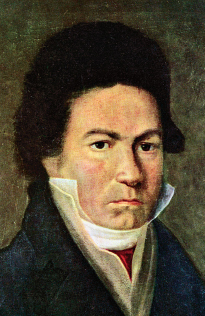Biography
Ludwig van Beethoven (1770–1827)

Probably the first musician to make a career solely from composing, Beethoven was regarded as a genius even in his lifetime. Like Mozart, he followed his father as a court musician; the Beethovens served the archbishop-
Nonetheless, Bonn was an “enlightened” court, ruled by the brother of Emperor Joseph II of Austria. The talented young musician could mix with aristocrats and audit classes at the liberal University. The idealism that is so evident in Beethoven’s later works — such as his Ninth Symphony, ending with a choral hymn to universal brotherhood — can be traced to this early environment.
Compared to Mozart, Beethoven was a slow developer, but by the age of twenty-
After the age of thirty, he became progressively deaf —a devastating fate for a musician, which kept him from making a living in the traditional manner, by performing. The crisis that this caused in Beethoven’s life is reflected by a strange, moving document (called the “Heiligenstadt Testament,” after the town where it was written, in 1802) that is half a proclamation of artistic ideals, half suicide note. But Beethoven overcame his depression and in 1803 wrote the first of his truly powerful and individual symphonies, the Third (Eroica).
Beethoven all but demanded support from the nobility in Vienna, who were awed by his extraordinarily forceful and original music as well as by his uncompromising character. An alarmingly brusque and strong-
Like many leftists — for the French Revolution invented the Left as we know it — Beethoven grew more conservative in later years. After life in Vienna was disrupted by French occupations, he went into a slump and kept himself going by writing music for counterrevolutionary celebrations. Ironically, he was never so famous or so well-
Beethoven had an immense need to receive and to give affection, yet he never married, despite various love affairs. After he died, passionate letters to a woman identified only as his “Immortal Beloved” were found; we now know she was the wife of a Frankfurt merchant. In his later years Beethoven adopted his own orphan nephew, but this was a catastrophe. His attitude was so overprotective and his love so smothering that the boy could not stand it and attempted suicide.
Beethoven had always lived with ill health, and the shock of this new family crisis hastened his death. Twenty thousand attended his funeral; his eulogy was written by Vienna’s leading poet.
Taste in many matters has changed many times since Beethoven’s lifetime, but his music has always reigned supreme with audiences and critics. The originality and expressive power of his work seem never to fade.
Chief Works: Nine symphonies, the most famous being the Third (Eroica), Fifth, Sixth (Pastoral), Seventh, and Ninth (Choral) ◼ The opera Fidelio (originally called Leonore), for which he wrote four different overtures; overtures to the plays Egmont, by Goethe, and Coriolan ◼ Violin Concerto and five piano concertos, including the “Emperor” (No. 5) ◼ Sixteen string quartets ◼ Thirty-
Encore: After Symphony No. 5 and the Piano Sonata in E, Op. 109, listen to the “Moonlight” Sonata; Sonata in A-
Image credit: AKG-